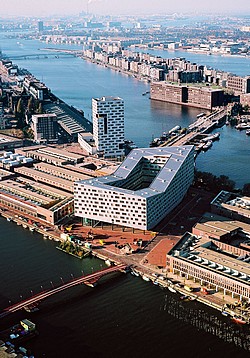Borneo-Sporenburg, a former harbour area along the shores of the IJ near Amsterdam's inner city is intended to resemble in its density the Jordaan, a lively Amsterdam inner city quarter. The developers, however, requested a suburban programme from the municipality. This was granted on the condition that the required density of 100 dwellings per hectare would be achieved. To achieve this urban concentration in a suburban programme, Adriaan Geuze of West 8 introduced a fresh typology: inspired by the surrounding water, he created a sea of low-rise buildings, given rhythm by the variation of blocks and open spaces. This rhythm recurs on a larger scale in the tapestry of land and water characterizing the whole area. The sea of low-rise buildings is interrupted by three enormous '
meteorites', both to throw into relief the low-rise landscape and to achieve the inner-city density. The inner city character is reflected in yet another way: the 3.5 m high ground floors of the low-rise buildings create a programmatic flexibility that allows for both living and working. The Whale is one of the three meteorites that mark the area. Within the same footprint as a '
Berlage block' (50 x 100 m) in Amsterdam South, a programme twice as large has been realized. By elevating the building on two sides - the line of the roof corresponding to the movement of the sun - the lower floors receive sunlight coming in from under the actual building. Accordingly, light and space have free access into the heart of the building. The result is a redefinition of the closed block: the inner area transforms the traditionally private domain into an almost public city garden. The elegant, elevated form conceals the enormous programme: 214 apartments with business areas underneath and an underground car park on a plot as large as a football field. As a consequence of its extraordinary design, The Whale consistently affords different views of the environment from various positions generating at the same time an enormous diversity of housing types, in the lower and upper edges of the building in particular. Conservatories provide a wide view of Amsterdam's inner city and across the expansive waters of the river IJ.




